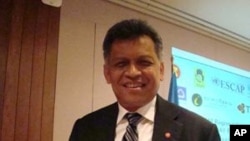The secretary-general of the Association of Southeast Asian Nations has called on Burma's government to ensure the coming elections help lead to national reconciliation. Surin Pitsuwan hopes Burma's conflicts with the international community over its human rights record may also be resolved after the vote.
When Burma - also known as Myanmar - became a member of the Association of Southeast Asian nations in 1997, many countries criticized ASEAN leaders because of Burma's questionable human rights record.
Burma has even created divisions within ASEAN, because some members, such as the Philippines, Malaysia and Singapore, have pressed the military government for political reforms. Other members, particularly Laos and Cambodia, disagreed.
After years of prodding, Burma is holding parliamentary elections on November 7th, the first in 20 years.
ASEAN Secretary-General Surin Pitsuwan Wednesday said he hopes the elections will offer a chance for national reconciliation and help end Burma's international isolation.
"Myanmar has been a major issue for ASEAN in its cooperation, interaction with the global community," he said. "We would like to see this issue behind us. And the only way that that can be done is to make sure that this election is going to be a relatively effective mechanism for national reconciliation."
In a news conference in Bangkok, Surin also said the elections need to be accepted as legitimate by a majority of Burmese.
Human rights groups and several Western countries call the vote a sham aimed at ensuring continued military rule. The armed forces are guaranteed a quarter of the seats in the new parliament.
Strict election laws meant that several political parties, including the leading opposition group, the National League for Democracy, could not take part in the vote. The laws required parties to expel members under detention, including the NLD's leader, Aung San Suu Kyi, who is under house arrest. The NLD refused to do so, and the government ordered it disbanded.
The government also will not set up polling stations in several border regions that are under the control of ethnic militias.
Surin says the aim should be that the elections produce a government acceptable to the international community.
"Now the date is set everybody is anticipating - with a sense of relief - that it is coming, real, definite," he said. "We hope that it will be accepted and it will function effectively, and after that recognition. All these things are in anticipation is just have to wait for the real result coming but all of us hope that Myanmar will cease to be an issue of irritation between ASEAN and the rest of the international community."
Several countries, including the United States have imposed economic sanctions on Burma's government because of its poor human rights record. The U.S., the European Union and several nations have long called on ASEAN to push Burma to make reforms. But there have been few changes. Rights groups say Burma holds more than 2,000 political prisoners and continues to repress free speech and use forced labor to keep the population in line.


















